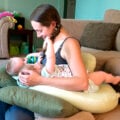The Twin Cities supports a uniquely vibrant birthing community. There are dozens of seasoned home-birth midwives, a handful of free-standing birth centers in the metro and surrounding areas and several hospitals striving to be more mom-baby friendly every day.
Add to that an unusually concentrated pocket of maternity and postpartum businesses and non-profit organizations — Blooma Yoga, The Childbirth Collective, Welcome Baby Care, Amma Parenting Center, The Postpartum Counseling Center, ECFE and Pregnancy and Postpartum Support Minnesota.
Minnesota also boasts a large number of birth doulas and medical professionals such as chiropractors and massage therapists specializing in perinatal health, making Minnesota a wonderful and progressive state in which to give birth.
Unfortunately, the benefits of this extensive birth community also present a challenge for parents, said Sarah Marshall, an Eden Prairie birth doula and president of The Childbirth Collective, a non-profit group of birth professionals aiming to provide education and resources during the childbearing years.
“With so many options between facilities, providers and doulas, it requires more of families to find the best fit,” Marshall said.
Though the options are wonderful and plenty, an expectant mother must prioritize the search for the birth scenario that best suits her family’s needs.
“Any two women can have the same medical needs and receive the exact same medical care,” Marshall said, adding that it doesn’t matter if their pregnancies are uncomplicated or if they have normal births or complicated ones. It’s about each woman’s quality of care on a personal level. “If she does not feel well-cared for, it can result in an unpleasant experience and even a traumatic one.”
Birth trauma and regret can put women at higher risk for post-birth complications such as low milk supply, infection and postpartum mood disorders.
The choice of where and how to birth is the first step toward a healthy and happy start for both mother and child.
Above: Rhiana Halverson of Rogers gave birth to her son, Hudson, at Maple Grove Hospital after a remarkably quick labor. Photo by Jennifer Liv Photography
Hospital birth
Mothers who choose a hospital birth usually want to know that every medical opportunity is readily available. The flip side of this advantage, is that hospital births sometimes come with unwanted or perhaps unnecessary medical intervention, which, in turn, can lead to further intervention.
Of course, there are thousands of wonderful hospital births every year and, in general, hospitals are trying to offer choices to new moms aimed at an optimal birth experience.
Women opting for a hospital birth should consider the following:
- The hospital’s Cesarean rate. This information can be found at The International Cesarean Awareness Network of the Twin Cities at icantwincitiesblog.blogspot.com. In 2012, local hospital rates ranged from 33 percent to 15 percent.
- Minnesota’s overall rate is 27 percent, while the national rate is 33 percent, according to the site.
- Is a tub available for pain management and possible water birth?
- Are you allowed to move freely during labor?
- Are doulas welcome? Your care provider’s stance on doula support should be clear. Anything other than, “I support the use of a doula 100 percent,” shows some level of unease.
- Even if you aren’t planning on hiring a birth doula, this question is important. If your OB doesn’t support the use of a doula, will he or she be comfortable with your mother or partner having a significant role in the delivery room? Will he or she honor your own instinctive choices or need for support measures?
- Reputation. What do your friends say? Your family doctor? Ask around.
Above: Jessica Frantz of Shakopee gave birth to her daughter, Cora, with her husband, Matt, by her side at Health Foundations Birth Center in St. Paul. Cora was 6 pounds and 2.5 ounces. Frantz gave birth in a bathtub after three hours of labor. Photo by Jennifer Liv Photography
Independent birth center
You might choose to have your baby at a birth center if you want an experience somewhere between a home birth and a hospital birth, and if you appreciate the midwifery model of care.
“The birth center setting is one that was created to feel like a home, but, of course, is not,” said Kerry Dixon, a certified nurse midwife at the Minnesota Birth Center in Minneapolis.
Birth centers are usually beautifully decorated and aim to offer a peaceful, uncomplicated environment for labor and birth. Recovery stay is usually brief. Water birth is often an option.
“Interestingly, birth center midwives and most home-birth midwives have the same emergency equipment available, but for some families, the fact that the birth center is responsible for set-up and cleanup makes them feel more comfortable with the setting,” Dixon said.
Sometimes a family will choose a birth center because of proximity to or affiliation with a hospital.
Not too long ago, the downside to independent birth centers was discontinuation of care in the event of a pregnancy becoming high risk or in the event of an emergency transfer.
Birth centers are now making an effort to bridge that gap: Dr. Steve Calvin, M.D., privately owns the Minnesota Birth Center. He and his staff of midwives have hospital privileges at Abbot Northwestern Hospital, which is right across the street from their Minneapolis location, making transfers seamless.
Likewise, Health Foundations Birth Center in St. Paul recently welcomed Dr. Dennis Hartung, M.D., to their team. Hartung is somewhat of a legend in the Midwest birthing community.
He specializes in — and is an advocate for — natural birth. He’s also skilled at breech delivery. Though the midwives at Health Foundations don’t have hospital privileges, a continuum of care is possible with Hartung.
Above: Tara Schmidt gave birth to her daughter, Norah, at her home in Crystal after only a few hours of active labor and 15 minutes of pushing. Photo by Jennifer Liv Photography
Home birth
Families choose to birth at home for a variety of reasons, most commonly because it’s where they feel the most comfortable. They’re seeking an intervention-free birth on their own terms and immediate postpartum recovery in their own bed.
Emme Corbeil, a certified professional midwife with Twin Cities-based Trillium Midwifery Care, said, “Birth is amazingly normal. If you are healthy and have a low-risk pregnancy, there are very few things that will get in the way of a completely normal yet amazingly transformative birth experience. Birth works!”
Home birth can be an empowering experience for a woman. The main drawbacks of birth at home are a bit of DIY work with insurance coverage, as well as a tendency to do too much too soon.
In your own home, without a staff of nurses, it’s tempting to just run a quick load of laundry or fix a meal when you should be resting.
Both parents-to-be should be comfortable with the idea of home birthing, if that’s their chosen path.
“It is not ideal if one part of the team — be it birthing mother or partner — is not comfortable birthing at home,” Corbeil said. “That sets up fear and anxiety which are not conducive to the hormonal processes of a normal physiological birth.”
There are many home-birth midwives in the Twin Cities and surrounding area. Most of them would encourage an expectant family to interview at least three midwifery teams before choosing.
A complete directory can be found at Minnesota Families for Midwifery at www.mfmidwifery.org.
Will you end up in a hospital anyway?
There’s a chance.
“The statistics nationwide are pretty clear that about 10 to 14 percent of birth center or home birth-planning mothers will transfer care to the hospital,” Dixon said. “Fortunately, it is usually for labor augmentation or pain relief and rarely for a true emergency.”
Asking questions of midwives during the interview process often quiets any fears mothers may hold about a non-hospital birth and many are surprised at how much medical equipment is available on site — including Pitocin, oxygen and suturing materials.
Photo by Jennifer Liv Photography
Trust yourself,
trust birth
In selecting your birth team and birth location, ask 100 questions — of your peers, your practitioners, your partner — and then ask 100 more.
Do your research and exhaust all options, until the decision becomes obvious. Trust yourself! When you feel secure in your choice, you’ll feel secure in your body’s ability to give birth.
Jen Wittes lives in St. Paul and is the mother of two. She’s helped many Twin Cities families in her work as a postpartum doula. Send questions or comments to [email protected]
















